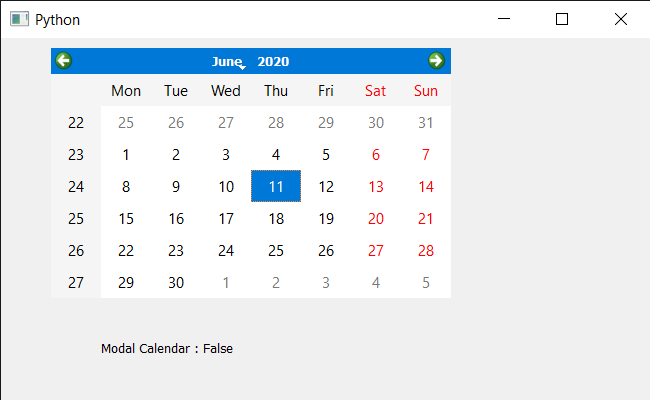PyQt5 QCalendarWidget – 模态小部件属性
在本文中,我们将看到如何获取 QCalendarWidget 的模态小部件属性。为了做到这一点,我们使用isModal方法,该属性保存日历是否是模式小部件。此属性仅对 Windows 有意义。模态小部件可防止所有其他窗口中的小部件获得任何输入。默认情况下,此属性为 false。
In order to do this we will use isModal method with the QCalendarWidget object.
Syntax : calendar.isModal()
Argument : It takes no argument
Return : It return bool
下面是实现
Python3
# importing libraries
from PyQt5.QtWidgets import *
from PyQt5 import QtCore, QtGui
from PyQt5.QtGui import *
from PyQt5.QtCore import *
import sys
class Window(QMainWindow):
def __init__(self):
super().__init__()
# setting title
self.setWindowTitle("Python ")
# setting geometry
self.setGeometry(100, 100, 650, 400)
# calling method
self.UiComponents()
# showing all the widgets
self.show()
# method for components
def UiComponents(self):
# creating a QCalendarWidget object
self.calendar = QCalendarWidget(self)
# setting geometry to the calendar
self.calendar.setGeometry(50, 10, 400, 250)
# setting cursor
self.calendar.setCursor(Qt.PointingHandCursor)
# creating label to show the properties
self.label = QLabel(self)
# setting geometry to the label
self.label.setGeometry(100, 280, 250, 60)
# making label multi line
self.label.setWordWrap(True)
# checking if the calendar is modal
value = self.calendar.isModal()
# setting text to the label
self.label.setText("Modal Calendar : " + str(value))
# create pyqt5 app
App = QApplication(sys.argv)
# create the instance of our Window
window = Window()
# start the app
sys.exit(App.exec())输出: 